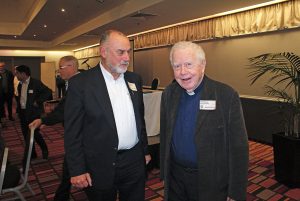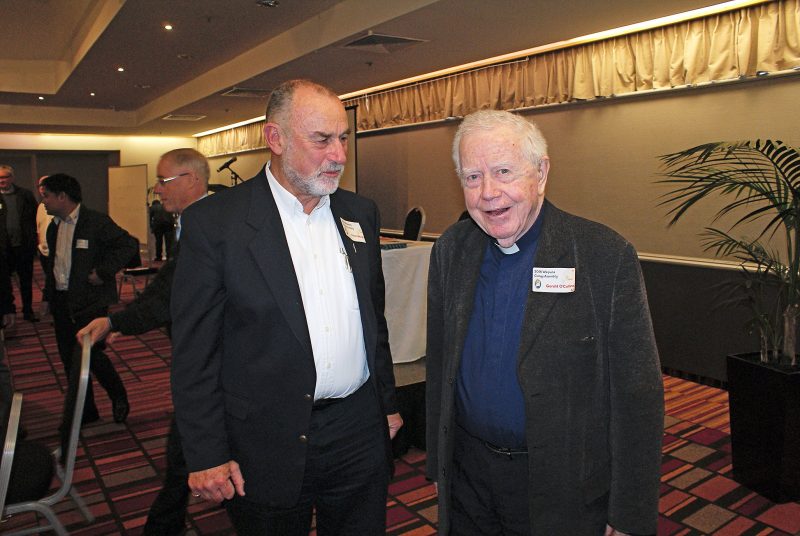An eminent theologian has called on New Zealand’s Catholic Church to make a direct
appeal to the Pope for permission to scrap the current English translation of the Roman Missal in use in this country.

Fr Gerald O’Collins, SJ, (right) with Papakura’s Fr Peter Murphy.
Fr Gerald O’Collins, SJ, made the call at a gathering of Auckland priests at Waipuna
Lodge in Mt Wellington on August 24.
Fr O’Collins, an Australian who was professor of systematic and fundamental theology at Rome’s Pontifical Gregorian University for more than three decades, described the current translation in use in English-speaking countries as “unfortunate” and a “kind of Latin dressed up as English”, which comes across as “clunky”.
He said he knows of quite a few priests who just don’t use it; instead they opt for
a previous 1973 translation or a 1998 ICEL translation that was rejected by Rome.
“There’s a fairly chaotic situation prevailing,” Fr O’Collins said.
But the time might be right for New Zealand to directly ask Pope Francis for permission to use the 1998 translation, he said, referring to a passage from Pope
Francis’s recent exhortation Amoris Laetitia.
The passage cited from Amoris Laetitia 3 reads: “Each country or region . . . can seek solutions better suited to its culture, and sensitive to its traditions and local needs.”
Fr O’Collins said: “Well one of the local needs is that people can understand.” Translation should be faithful, but should also be communicable, he added.
The Pope might be amenable to such a request from New Zealand, the Jesuit said, citing the speed with which the Pontiff intervened in the Prefect of the Congregation for Divine Worship’s push for Masses celebrated ad orientem, towards the liturgical east.
Fr O’Collins said a New Zealand request should bypass top officials at the Congregation for Divine Worship, which, he noted, has been dilatory in passing on
material – for example, it took about a year to pass on an instruction about the possibility of washing women’s feet on Holy Thursday.
The 1998 edition could be introduced “ad experimentum” in New Zealand, the theologian said. “Some of the best things in the Catholic Church were introduced
‘ad experimentum’, and stayed there.”
“Ad experimentum for the New Zealand church would be a very great help to other parts of the Englishspeaking church,” he said.
Fr O’Collins said further requests should accompany a New Zealand appeal to Pope Francis about liturgical translation.
The first would be that the 2001 instruction Liturgiam Authenticam be suspended. The document stressed the need for translations which respected the structure and content of the Latin text.
Fr O’Collins called the document “a desperately bad piece of guidance for translations”.
Fr O’Collins also suggested the New Zealand church ask Pope Francis to “rescind the obligation of bishops’ conferences to seek confirmation of their vernacular translations from the Congregation for Divine Worship”. The Jesuit said this obligation was not required by Vatican II’s Sacrosanctum Concilium.
The theologian said his overall suggestion was really for the New Zealand bishops.
In 2015, Fr O’Collins issued an open letter to the world’s English-speaking bishops calling for the adoption of the 1998 translation.
In the letter, Fr O’Collins wrote that when the 1998 ICEL translation, the fruit of 17 years of work, was “. . . sent to the Congregation for Divine Worship (CDW), [it] was simply rejected without any dialogue. Roman authorities set up a committee called Vox Clara (“a clear voice”) which was largely responsible for a ‘revised’ translation in 2010 that came into force in November 2011. Ironically, the results produced by Vox Clara were too often unclear and sometimes verging on the unintelligible”.
In March, 2015, the secretary of the Congregation for Divine Worship, Archbishop
Arthur Roche, said a different English version of the missal could not happen.
The archbishop noted that the 1998 version translated the 1975 Roman Missal, but a new Latin Missal was introduced in 2002, making the 1998 edition outdated.
Fr O’Collins told the Auckland priests that the 1998 translation was not “obsolete” as Archbishop Roche indicated, but it would need updating, as new feasts have been introduced in the years since then.
Auckland Bishop Patrick Dunn, who was at the priests’ gathering, said he would convey Fr O’Collin’s suggestions to the next meeting of theInternational Commission on English in the Liturgy.
Bishop Dunn added that New Zealand’s bishops have been grappling with issues raised by Liturgiam Authenticam for some time now.
Fr O’Collins concluded his appeal by citing the example of New Zealand’s Charles Upham, VC and Bar, who earned the Victoria Cross twice in action in World War II.
The Jesuit said his idea is a bold one, but New Zealand is a bold country, and it is not by accident that it produced a hero like Charles Upham.

Reader Interactions